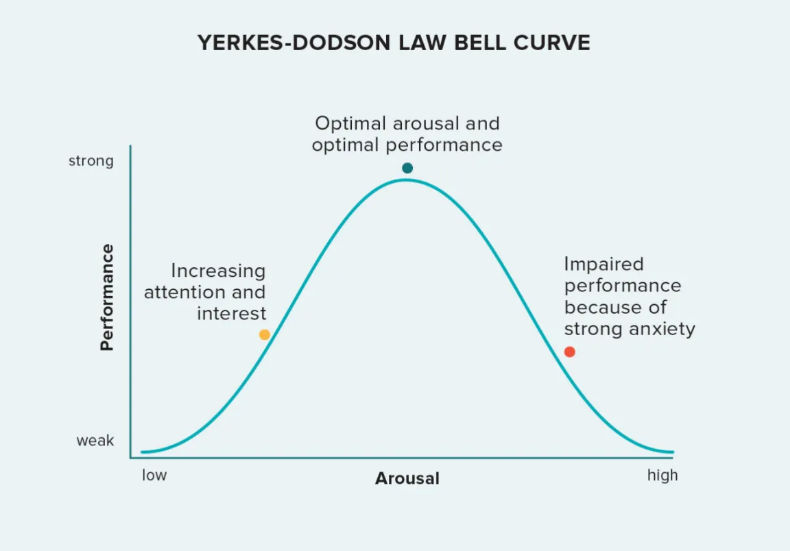Stress is normally perceived as a bad thing. We often talk about it as response to being put under pressure or overwhelmed, meaning we treat it like something we must avoid to be functional and lead a healthy life. However contrary to popular belief, stress does have some benefits that we can take advantage of to perform better in our work and life.
Can stress be good?
Stress is not exclusively the presence of anxiety or the pressure of looming deadlines and heavy workloads. Stress can be more accurately described as a type of stimulation: a response to a stimulus (stressor). Too much stimulation, and our response can get out of control making us feel panicked, frustrated, or sick. But, with the right amount of stimulation, it can become positive energy that drives our attention and focus, and enhances performance and productivity!

What is the relationship between stress and performance?
The Yerkes-Dodson law describes the empirical relationship between performance and arousal (stress). On the bell curve below, we see three tiers of “arousal” highlighted: there’s low arousal, optimal arousal, and high arousal. Today, we are going to be focusing on high arousal and how we can get ourselves back to optimal arousal, where we are feeling good and our performance is at its peak.

Retrieved from Healthline Media at: https://www.healthline.com/health/yerkes-dodson-law
High arousal typically induces anxiety and distress, which impairs our performance. Even those who reserve a more stoic nature are affected by high levels of stress. They might find it hard to focus or it might make a task too difficult causing them to lose interest. Other people might try to push themselves through high levels of stress and continue working. This is a very dangerous thing to do as it can quickly lead to unhealthy lifestyle habits, burnout, and resentment for work. So how do we manage high arousal where the stress is too much?
High levels of stress must be F.A.C.E.D.
When we experience high levels of stress, we must try to bring ourselves back to that “optimal arousal” level where performance is at its peak. Try stopping for a moment. Is this stress something you can change, or are you thinking ahead and imagining worst case scenarios? Think about how this stress can be F.A.C.E.D.:
F – Flexible
Can I be flexible in how I respond to this stressor? It can be hard to change your initial reaction. Flexibility is key to positively handling stress: moving on from a minor stress or one that can’t be dealt with straight away is crucial to healthy function.
A – Acceptance
Secondly, is it a stressor which I need to accept? Not all stress can be dealt with quickly and easily. Sometimes the best and only thing you can do is accept the situation and begin to take constructive steps to address the stressor. Your stress can even be coming from stressing over a stressor! If you can accept that this stressor is part of life for now, and that you will deal with it the best that you can, your extra stress can be immediately reduced.
C – Control
Like acceptance, ask yourself if this stressor is something you can control. For many of us, the feeling of losing control is too much to handle, causing us to feel even more stress. When stress disrupts our work or home, it can feel like everything is spinning out of control.
In these situations we must stop and look around for the things in our lives that are orderly and have a recognisable pattern to them. Use this to ground yourself and remember that there are some things within your control. An example might be when work is feels out of control your whole life might feel out of control. Yet, things at home might actually have pattern and order to them.
E – Enjoy
As they say, laughter is the best medicine. Humour is a great way to deal with stress, looking at the light side by making a joke or finding a silver lining to your stress. It might even help you develop a new perspective on the stressor!
D – Detach.
Last but not least, we can detach ourselves to relieve overwhelming feelings of stress. Make the conscious decision to detach and mindfully move the stressor away from the forefront of your mind. We are not our best selves when we are overwhelmed with stress, so sometimes it can be better to detach ourselves and come back when we are aren’t overwhelmed. Popular ways of detaching include taking a walk, meditating, or playing sport.
If you think that you or a colleague might be struggling to deal with stress, one-on-one coaching and consultations are available. Get into contact with our friendly team to find out more!
To hear more about health and wellbeing in the workplace, follow us on LinkedIn!






